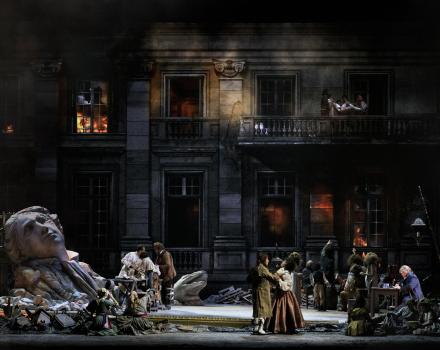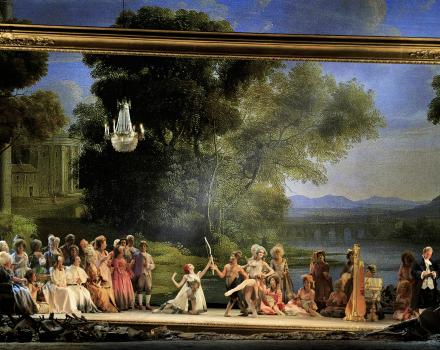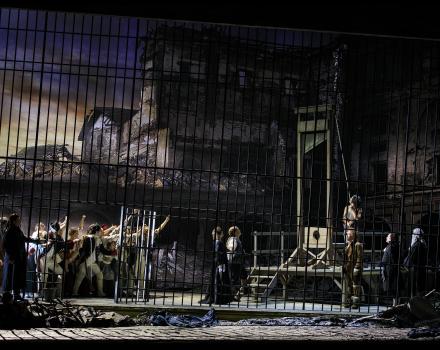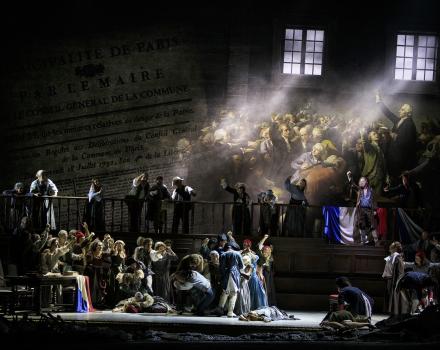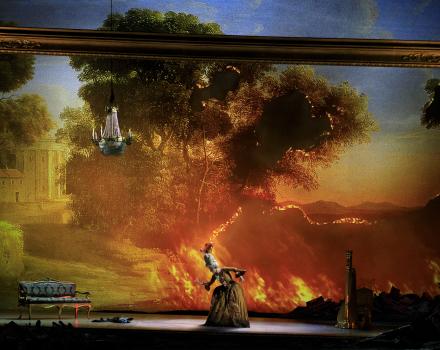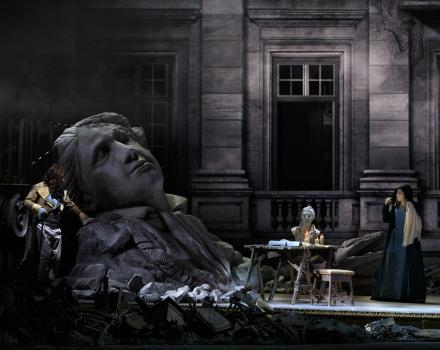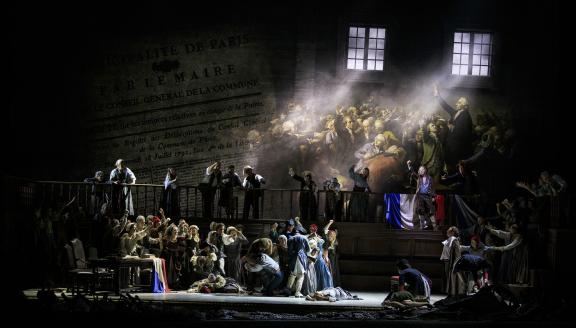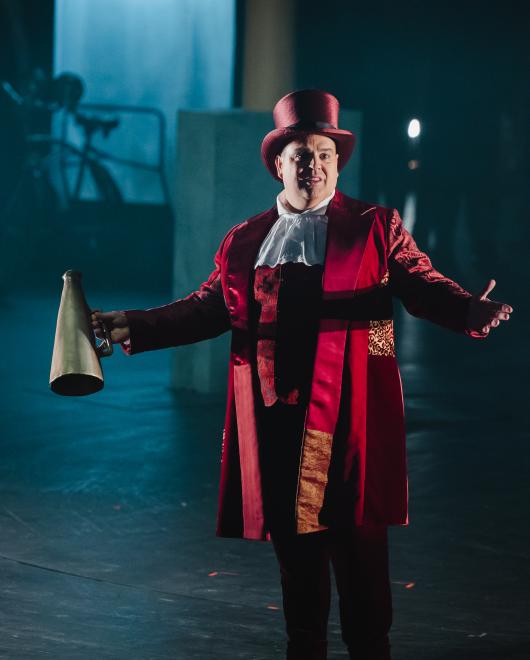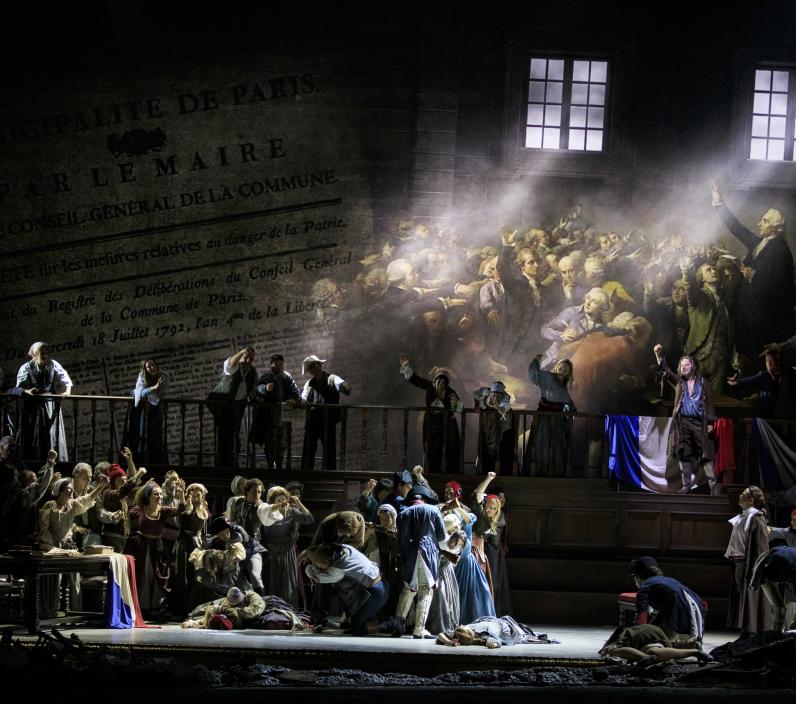
Andrea Chénier

Inspired by the life of the poet André Chénier at the time of the French Revolution, Giordano’s opera with libretto by Luigi Illica, faithfully portrays in detail the story of the protagonist, his love for Maddalena di Coigny, his arrest as a counter-revolutionary and their final hours.
Andrea Chénier is 19th century Italian composer, Umberto Giordano’s most famous opera. His quest for naturalism led to the inclusion of the Revolutionary songs ‘Ça ira', the ‘Carmagnole' and the 'Marseillaise', and contrasting 18th-century dances and pastoral music. Set against these are the beautiful lyrical melodies for which the opera is famous - Chénier's 'Improvviso', Gérard's ‘Nemico della patria', Maddalena's 'La mamma morta', and the final duet ‘Vicino a te'. The chorus, representing le peuple in their many guises, plays a larger than usual part; the revolutionary zeal in some of their music making a significant contribution to the verismo nature of the work. Teatro Comunale di Bologna’s 2022 production is conducted by resident Ukrainian music director Oksana Lyniv with an authentic staging by Pier Francesco Maestrini and a distinguished cast.
Cast
Andrea Chénier, a poet | Gregory Kunde |
|---|---|
Carlo Gérard | Roberto Frontali |
Maddalena di Coigny | Erika Grimaldi |
Bersi, her maid | Cristina Melis |
The Countess of Coigny | Federica Giansanti |
Madelon | Manuela Custer |
Roucher | Vittorio Vitelli |
Pietro Fléville | Stefano Marchisio |
Fouquier-Tinville | Nicolò Ceriani |
Mathieu aka Populus | Alessio Verna |
The Incredible | Bruno Lazzaretti |
The Abbé | Orlando Polidoro |
Schmidt / Master of the Household | Luca Gallo |
Dumas | Luciano Leoni |
Filandro Fiorinelli | Antonio Ostuni |
Orchestra | Teatro Comunale di Bologna Orchestra |
Chorus | Teatro Comunale di Bologna Chorus |
| ... | |
Music | Umberto Giordano |
|---|---|
Text | Luigi Illica |
Conductor | Oksana Lyniv |
Director | Pier Francesco Maestrini |
Sets & Video | Nicolás Boni |
Costume | Stefania Scaraggi |
Lights | Daniele Naldi |
Choreography & Assistant Director | Silvia Giordano |
Chorus Master | Gea Garatti Ansini |
| ... | |
Video
The story
Act I
France, 1789. In the home of the countess of Coigny, Carlo Gérard and the other servants are preparing for the evening festivities. When left by himself, Gérard airs his antipathy towards the aristocracy and predicts the impending doom of the ruling class. The countess, accompanied by her daughter, Maddalena, enters the ballroom to check that everything is ready to receive the guests. Gérard ponders the girl's beauty. The guests arrive. They include Fléville, a novelist, who enters the room together with his friend, the poet Andrea Chénier. One of the invitees, a priest, brings disturbing news straight from Paris. A short dramatic work follows: a performance of a pastoral play by Fléville. The countess also asks Chénier to recite a poem, but he refuses. Maddalena begins to taunt the poet, provoking him until he finally relents. He delivers a verse that starts with a romantic theme and then quickly becomes political, ending as a parable against tyranny. The aristocrats are scandalized, but the poet's words have had a great impact on Maddalena. In order to relieve the tension, the guests move on to the dancing, which is interrupted by a crowd of famished people. Gérard has let them into the house, but then chases them back out at the command of the shocked countess, whose service he leaves as he departs together with the unwanted visitors. The guests attempt to lift their spirits with another dance.
Act II
Paris, 1794. The city is under Robespierre's reign of terror. Maddalena and her servant, Bersi, have come to the capital, where Bersi has become a courtesan in order to support both of them. The girl chats with an informer as they both watch Chénier, who is sitting nearby, and his friend Roucher. Roucher advises Chénier to flee Paris, but the poet's heart compels him to stay: for some time he has been regularly receiving letters from a mysterious, unknown girl. Roucher convinces him that the mysterious girl is most certainly a woman of loose morals, and so the disappointed Chénier decides to abscond with a fake passport. Gérard, now one of the leaders of the Revolution, instructs the informer to find Maddalena for him, which the spy promises to do. Bersi approaches Chénier and delivers a message from her mistress: she asks the poet to wait for her. Roucher and the spy observe from a distance. Maddalena appears dressed as a maidservant, and when she quotes to Chénier from the poem she had heard him deliver at Madame de Coigny's ball five years earlier, the poet recognises the girl. Maddalena, who has been living in great danger, finds refuge in Chénier's arms, and the two profess their love for each other. The informer tells Gérard that he has found the lady, and he and Gérard arrest the couple before they can commence their escape. The poet asks his friend to look after Maddalena; he himself starts to fight a duel with the revolutionary leader. Gérard is wounded and, recognising the poet, encourages him to flee, as his name is included on the list maintained by Fouquier-Tinville, the public prosecutor of the revolutionary tribunal. Andrea Chénier escapes, but Gérard tells the crowd gathering around him that he has been wounded by an unknown assailant. The mob blames the deed on the Girondistes.
Act III
In the waiting room of the Revolutionary Tribunal, the somewhat inebriated Mathieu Populus is speaking to the people. The homeland is in danger: France is under attack by all of Europe. Gérard, who has recovered from his wounds, appears and continues Mathieu's speech. The people are moved by it and toss their last valuables into the collection box. An old and blind woman named Madelon even offers up her grandson, the last living male member of her family, for the defence of the country. The lad is taken up into the register and the crowd is soon out on the street singing La Carmagnole, the revolutionary anthem. The indefatigable informer brings more news: Chénier has been captured. Although Maddalena has disappeared, the spy reassures Gérard that if the case against the poet is strong enough, he can be condemned to death, and in that case there will be no need to look for Maddalena, since she will come on her own to beg for her beloved's life. Gérard writes out the charges against Chénier and, although he does not intend to behave dishonourably, his passion for Maddalena finally gets the better of him. Just as the spy predicted, Maddalena arrives. Gérard's crazed confession of love pushes the girl, who has already suffered a great deal, into a state of despair. Everyone around her has died, her mother has been killed, Bersi has taken up a life of sin for her sake and Chénier is languishing in prison. In exchange for her beloved's life, she is willing to give herself to Gérard. Gérard undergoes a change of heart and promises Maddalena that he will save Chénier even at the cost of his own life. The people stream into the chamber, curious to watch the hearings and executions. The jury and the president appear, along with Fouquier-Tinville, the public prosecutor. Finally, the accused are led in. Chénier is accused of treason, as well as of writing seditious poems against the revolution. The poet proclaims his innocence, but to no avail: the tribunal does not believe him. Gérard appears to testify in his favour, admitting that he was the one who wrote the charges and that he is now publicly withdrawing the allegations. Fouquier-Tinville remains implacable, and there are murmurs of bribery among the people. The jury's verdict: death.
Act IV
At the Saint Lazare prison. Andrea Chénier completes his final poem and shows it to his friend, Roucher. It is getting late, and the guard sends his friend away. Gérard escorts Maddalena to the prison. With gold and money, she pays off the guard so that when the executions are being carried out and the name of Idio Legray is called, she can take the condemned prisoner's place and thus die together with her beloved. The lovers meet in the cell and prepare for death together. It is growing light, and the hour of judgement is at hand.
Insights
An introduction to Andrea Chénier
adapted from an article by Susanna Franchi, Editor-in-Chief at Il giornale della musica
Next time you go to Paris, drop by Picpus Cemetery where the poet André Chénier is buried; for before he became a tenor he was a historical figure, a poet guillotined on 25 July 1794. He was buried in a mass grave at the Picpus like the other 1,306 people who were guillotined on Place de la Nation between 14 June and 27 July 1794. Today, there is only a cenotaph for him: ‘André de Chénier. Son of Greece and France. 1762-1794. Served the Muses. He loved wisdom. He died for truth.’ A poet guillotined, a French Revolution in the background, the love for a countess and a butler who becomes a revolutionary leader: the ingredients for a series are all there.
André Chénier was born in Constantinople on 28 October 1762. At the age of sixteen, he already knew how to read Greek and had translated Sappho, he attended Jacques-Louis David's atelier and became a friend of Vittorio Alfieri, he served in London as secretary to the French ambassador, defended Charlotte Corday in an ode, called Marat a ‘tiger’ and a ‘snake’ and often spoke out against Robespierre. He was arrested in Passy on 7 March 1794 and imprisoned in Saint-Lazare on 24 July. He was accused of conspiracy and guillotined the next day. His friend and poet Roucher (who is saved in the opera) was on the cart leading him to the gallows. Together, until the end, they discussed Racine. Ironically, Robespierre, who had denied him a pardon, would be executed only two days later. In prison, André wrote Ode pour une jeune captive, and his brother Marie-Joseph Chénier described it this way: ‘Ode by André Chénier, massacred on 7 Thermidor with the unfortunate Roucher and twenty other inmates of Saint-Lazare, accused, with the others, of being the author or an accomplice of the prison conspiracy. It is said that it was Mademoiselle de Coigny, an inmate in that same prison, who inspired this enchanting piece of poetry.’ It is this note that triggers the imagination of Joseph Méry, who in his novel André Chénier invents the romance with Mademoiselle de Coigny. But the reality is quite different. Anne-Francoise-Aimée de Franquetot, Countess de Coigny, had married the Duke de Fleury, had been in England (‘the most beautiful French woman I have ever seen’ says Horace Walpole) where she had become the mistress of Count Casimir de Montrand. Back in France she had been divorced, accused of sympathising with the royal house, and arrested with Montrand: the two had bribed a jailer (a bit like what happens in the opera...) and managed to escape. Aimée became friends with Empress Josephine and died at the age of 51, in 1820. Another curious fact to know about her life is that she was raised by an aunt, the Marquise de Coigny, a woman of undisputed charm whom Choderlos de Laclos used as the inspiration for the figure of the Marquise de Merteuil in his Liaisons dangereuses.
It will be necessary, sooner or later, to write the history of all the libretti ‘lost’ by Alberto Franchetti: he had the libretto of Andrea Chénier and gave it to Giordano, he had that of Tosca and passed it on to Puccini, he gave up an opera from Innamorata dei fiori which thus became Iris by Mascagni... On 20 April 1894 Franchetti wrote to Giordano: ‘Knowing that you are in need of a libretto, I am quite happy to cede you my rights to Andrea Chénier, by Luigi Illica, provided that you return to me the 200 lire that I paid Illica to have the exclusivity of the said libretto.’
Librettist Luigi Illica documented himself a great deal. On the first page of the libretto he wrote, ‘From H. de Latouche, Méry, Arséne Houssaye, Gauthier and J. Ed E. de Goncourt, had the idea of dramatising the character for music theatre and drew historical details of period.’ Its strength is the mix of history with a capital ‘H’ (Robespierre and Fouquier Tinville parade in Act 2) and history with a lowercase ‘h’, namely the Andrea-Maddalena-Gérard love triangle.
Usually booklet captions serve just to explain who exits from the right, who enters from the left, and whether the protagonist wields a sword or throws his hat on the floor out of annoyance, but in Illica's case they are real historical dissertations, precise indications and analyses of the characters' behaviour. The cinema of the Lumière brothers was born a few months after the premiere of Chénier, and it is as if Illica had written, in his captions, the directions for a film director's script.
In 1903, with the success of Chénier behind him, Giordano wrote to Illica the three rules that must be followed for an opera to be applauded: ‘1) The audience is not captivated until they see a tongue in a mouth on stage – 2) For success you need a movement that leaves no place for a yawn – 3) For when the music is made, everything fits, and the same melody can serve all the different feelings of this world.’
Andrea Chénier premiered on 28 March 1896 at La Scala: Rodolfo Ferrari conducted, Giuseppe Borgatti was Andrea, Mario Sammarco played Gérard and Evelina Carrera was Maddalena. ‘Complete triumph first third fourth act. Second appreciated as well. 20 curtain calls artists and maestro’ was the telegram the publisher Sonzogno sent to Illica.
Gallery
